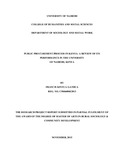| dc.description.abstract | In the past decades, the public procurement system in Kenya has undergone significant
developments. From being a system with no regulations in the 1960s, and a system regulated by
Treasury Circulars in the 1970s, 1980s and 1990s, the introduction of the PPDA Act of 2005 and
the Procurement Regulations of 2006 has introduced new standards for public procurement in
Kenya. Implementation of procurement process in public institutions has faced many hurdles and
the levels of its performance have been wanting and this has been a concern to different
stakeholders. Public procurement is a significant and yet understudied phenomenon. Thus, the
study examined Public Procurement Process in Kenya: A Review of its Performance in the
University of Nairobi, Kenya.
Literature review focused on adaption of Procurement Act and regulations, types of tendering
procedures, procurement plans and tendering committees in relation to performance.
Design/Methodology/Approach: The study adopted a qualitative research design because it
provided flexibility and afforded the researcher the opportunity to conduct an in-depth research.
Case study on the procurement for AIBUMA conference was also done.
A sample of 32 respondents was purposively selected from CHSS departments, Faculty, Schools
Institutes, Centres and Procurement Management Unit from the UON. The finding shows that
the majority of the respondents held the view that the Practice of Public Procurement Process in
the University of Nairobi has been entrenched and there are structures in place to support the
public procurement system but they face challenges. Over 11% of the respondents rated the
performance of the procurement as below average and identified a number of challenges. The
current legal framework provides for fully decentralized procurement process, leaving the full
responsibility of undertaking procurement to the tender committee and the procurement unit at
the level of CHSS public entity.
There is indication that UON being a public entity is governed by the PPDA Act 2005, its
attendant Regulations 2006 and instructions issued by the PPOA and for effective
implementation the political good will is needed. The Procurement planning and its
implementation in UON is more affected by the lack of cooperation between Procurement
Management Unit and user department. It‘s evident that UON does not carry out market
capability analysis in order to determine where to procure from and at what price.
The study recommends UON should adhere to its service charter, procurement should be
incorporated with the other aspects of functions within the organization, such as Finance, and
human resources, execute the public procurement laws strictly and procurement staff be provided
with training in order to improve their understanding and interpretation of the PPDA Act and
Regulations. Perfect supervision and accountability mechanism, use of information technology to
strengthen the supply side via E-procurement as it has a range of potential benefits for
procurement processes.
Finally, the study recommends a further research to be carried out in other procuring entities to
find out if the same results can be obtained. | en_US |

